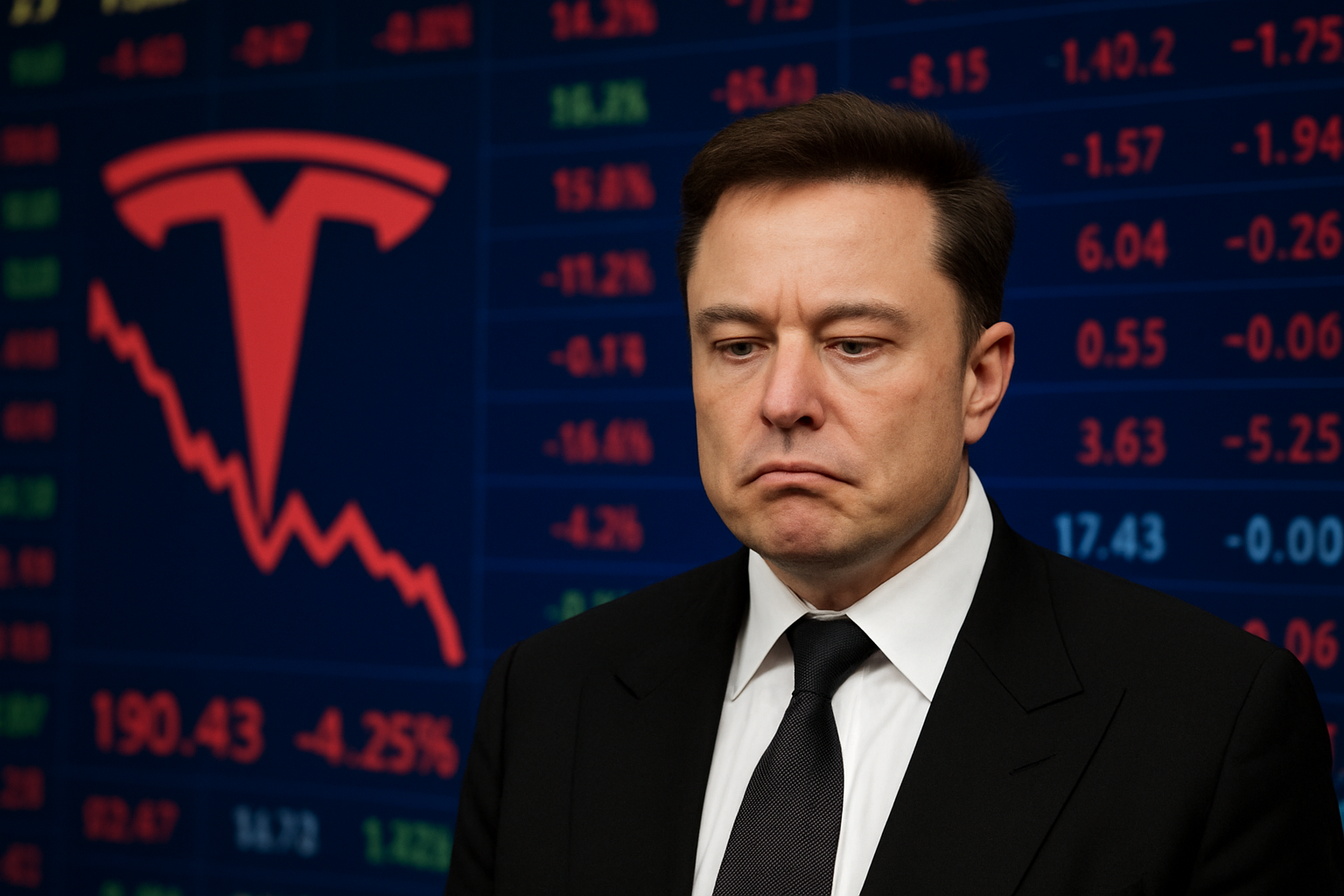Elon Musk’s latest political maneuver—launching a new political movement called the “America Party”—has rattled financial markets and Tesla shareholders alike.
Less than a day after Musk’s announcement on July 7, Tesla shares tumbled nearly 7%, erasing over $68 billion from the company’s market capitalization. The steep decline signals a growing unease among investors who fear Musk’s political ambitions could be overshadowing his role as Tesla CEO.
The electric vehicle giant, already navigating slowing sales and stiff global competition, now faces a wave of skepticism from Wall Street about its leader’s growing entanglement with Washington politics.
Investors Fear a Distracted CEO
Dan Ives, managing director at Wedbush Securities, expressed concern that Musk’s escalating political engagement is at odds with shareholder priorities. Musk’s growing involvement in politics and his attempts to challenge Washington’s establishment are taking Tesla in a direction that’s completely misaligned with what investors want right now. Ives noted in a statement on Sunday that “Tesla requires Musk’s full attention as CEO—not distractions from political feuds or party launches.”
He added that while Musk’s hardcore fan base might stand by him regardless, many investors are growing weary of his political detours, which they see as a serious distraction.
Tesla’s ongoing distractions are beginning to show up in tangible ways on Wall Street. The company’s stock has already tumbled 27% since the start of 2025, erasing tens of billions in shareholder value. Equity analyst Jed Dorsheimer cautions that if this downward trajectory persists, Tesla could see more than $80 billion wiped from its market capitalization. Such a steep decline not only signals shaken investor confidence but also raises broader questions about Tesla’s ability to maintain its dominance in an increasingly competitive electric vehicle market, where rivals are aggressively expanding and market conditions remain volatile.
Musk vs. Trump: A Costly Feud
Tesla’s turbulent stock performance has coincided with Elon Musk’s escalating feud with former President Donald Trump. Though the two once collaborated—most notably on the now-defunct “Department of Government Efficiency” (DOGE)—their relationship has since soured.
After stepping back from DOGE in May, Tesla shares enjoyed a brief rally—surging over 20% that month—as investors welcomed Musk’s renewed focus on the company, but the optimism was short-lived.
On June 5, Tesla shares plummeted by 14%—a single-day loss of more than $150 billion in market cap—following a new round of Trump-Musk tensions. Since the start of the year, Tesla’s stock has slid from $379.28 to $293.94 as of July 7.
Political Fallout Echoes in Global Sales
Musk’s entry into politics is sending shockwaves beyond Wall Street. Tesla’s global vehicle deliveries have slowed dramatically. Between April and June 2025, EV sales declined more than 13% year-over-year. Sales in Europe, where the broader EV market is growing, have been particularly disappointing—dropping by nearly 50% in April alone.
Tesla’s performance in China—a vital market—slipped in the first half of 2025, with deliveries falling to 2.63 lakh vehicles from 2.78 lakh during the same period in 2024. Globally, the company’s Q1 sales also declined, dropping to 3.37 lakh units from 3.87 lakh in the first quarter of the previous year.
Internal documents also reflect these struggles. In a letter to the U.S. Trade Representative dated March 11, Tesla warned that recent U.S. tariff policies had led to retaliatory tariffs abroad—hurting its competitiveness in global markets. “US exporters are inherently exposed,” the company wrote, adding that increased costs for U.S.-made EVs had made them less appealing internationally.
Wall Street’s Growing Discontent
An informal Morgan Stanley survey from March found that 85% of nearly 250 clients viewed Musk’s political activism as having a negative or highly negative effect on Tesla’s business. That sentiment now appears to be bleeding into the company’s bottom line and long-term growth potential.
Pressure is building on Tesla’s board of directors to step in if Elon Musk continues to blur the line between his personal political ambitions and the company’s business interests. Critics argue that his outspoken support for the so-called “America Party” risks distracting from Tesla’s core mission and could further unsettle already wary investors.“
It wouldn’t be surprising if the Tesla board takes a more active role, depending on how far Musk pushes this America Party initiative,” one industry insider noted. Intervention by the board could range from behind-the-scenes guidance to more formal governance measures, though any action would be closely scrutinized given Musk’s outsized influence over both Tesla’s strategy and its public image.
The growing debate underscores a fundamental tension: Tesla’s remarkable success has long been tied to Musk’s vision and charisma, yet those same qualities now threaten to expose the company to political risks that may erode shareholder value and market confidence.
A Hit to Musk’s Fortune
Musk’s net worth has taken a significant blow as well. On July 7 alone, he lost an estimated $15.3 billion, bringing his year-to-date decline to $86.7 billion. According to Billionaires Index, his current net worth stands at $346 billion—still the world’s richest, but with a noticeable dent.
Donald Trump, for his part, has not shied away from weighing in. He dismissed the America Party as “ridiculous,” casting doubt on both its legitimacy and Musk’s ability to translate personal influence into a viable political movement. Trump went further, warning that Musk’s growing entanglement in politics could blur the lines between public service and private gain. As an example, he pointed to the possibility of appointing a former Musk ally from NASA to a senior government position, arguing that such a move would inevitably raise concerns about conflicts of interest—particularly given Musk’s deep financial and strategic stakes in the private space sector. By framing Musk’s political aspirations as both impractical and ethically questionable, Trump sought to undermine his credibility while reminding audiences of the risks of mixing entrepreneurial empires with national governance.
What’s Next for Tesla?
Tesla is scheduled to hold its annual shareholder meeting on November 6—an event likely to be dominated by questions about Musk’s political activities, the company’s slowing sales, and the path forward amid rising competition in the EV space.
As Musk champions what he calls “the true will of the people,” investors are increasingly calling for a return to the priorities of Tesla’s mission—and a CEO who is fully focused on leading the company through its most challenging period in years.

